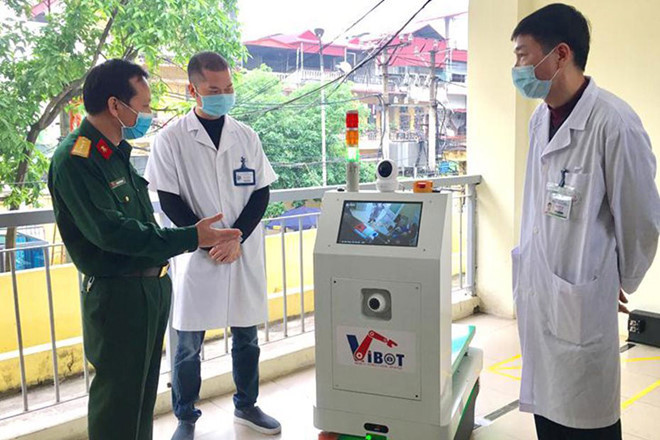If the robot is put into operation in a large scale, it will undertake a lot of work which is being done by medical workers
VIBOT-1a, the medical robotic assistant, which the Ministry of Science and Technology (MST) requested the Military Technical Academy (MTA) to manufacture in accordance with the US Aethon’s TUG model, will assist the transportation of medicine, food and necessities, and help carry waste in hospitals and isolation areas.

On April 7, VIBOT-1a was put into trial operation. It carried food, medicine and took away waste from rooms at the Bac Thang Long Hospital, which has been reserved specifically for the isolation and treatment of Covid-19 patients.
“If the robot is put into operation in a large scale, it will undertake a lot of work which is being done by medical workers in Covid-19 treatment areas, especially in isolation areas, thus helping medical workers restrict contact with people and mitigating the infection risk,” said Trinh Dac Hoa from Bac Thang Long Hospital.
It is estimated that each robot can undertake the work of 3-5 medical workers.
According to Colonel Tang Quoc Nam from MTA, VIBOT is designed as a multi-functional robotic assistant, flexible enough to satisfy specific requirements for each isolation area. It can carry many kinds of goods with the weight of up to 100 kilograms.
All the activities of the robotic system are monitored and regulated from a distance, which facilitates the expansion of the operation scale of robots, and adds more robots to the robot system, if necessary.
VIBOT-1a version uses magnetic stripe navigation and identification card positioning technology, which is simple yet highly reliable, allowing the robot to move in the quarantine area to perform tasks.
VIBOT-1a is capable of detecting and avoiding collisions thanks to sensors installed in the front and rear. With a large capacity battery pack and automatic charging station, VIBOT-1a can work continuously for 12 hours and automatically returns to the station to charge when running out of power.
Dr Nguyen Van Kinh, former director of the Central Hospital for Tropical Diseases, who proposed the manufacture of robots to serve people in quarantine at z meeting with MST two weeks ago, also praised the applicability of VIBOT-1a.
“It is a great achievement to manufacture the robot just within two weeks,” Kinh said, adding that the robot needs to be put into operation to ease pressure on transportation and mitigate the possibility of medical workers getting infected with virus. The numbers of infected medical workers in China and Italy are very high.
This is the initial product that mainly meets transport needs, so it just needs a 'moderate' technology level, according to Dao Van Hiep, head of the consultancy board of the project. In the future, the research team will need to create smarter robots.